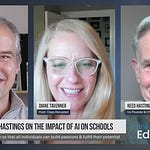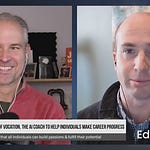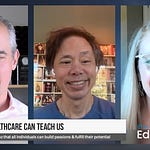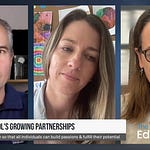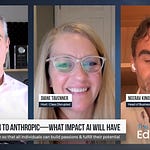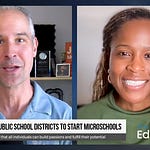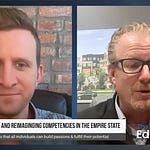Over the years, I’ve spoken to many of the leaders of a variety of microschools. In my conversation with Luis Brito E Faro, we explore the vision behind Brave Generation Academy, a microschool with its roots in Portugal but hubs all over the world just two years into its existence. The microschool network is serving roughly 1,000 students today with locations in South Africa, Namibia, Mozambique, Kenya, India, and now the United States as well. They serve not only students in 6th through 12th grade, but also students pursuing higher education online. And more plans are in the works. We talked about the day-in-the-life of a student, as well as the freedom and flexibility to pursue a student’s passions they offer—and how they knit together their extreme personalization with the importance of community.
As always, subscribers can listen to the conversation, watch it, or read the transcript below.
Michael Horn:
I'm Michael Horn, and welcome to the show where we are dedicated to building a world in which all individuals can build their passions and fulfill their human potential. And to help us think about that very topic today, we have Luis Brito Faro. He's one of the founders of Brave Generation Academy. Luis, it's great to meet you and great to have this conversation.
Luis Brito E Faro:
It's awesome to be here, Michael. Thank you so oh, well, thank you.
Michael Horn:
I mean, look, you're coming to us from Portugal today and I want to dive right into the morning warm up because you are one of the co founders of Brave Generation Academy. Before I give my spiel on what I think Brave Generation Academy, why don't we just go from your own voice telling us what is the schooling network you've set up?
Luis Brito E Faro:
Absolutely. So we're a network of microschools. We serve learners from 6th grade and above up to masters actually. So we already have a university BGA for adults. We use a self-directed learning approach so our learners can set their own goals and define the pace that they study. And we basically have three pillars knowledge, which is the academic side. So the subjects that you sit, or the bachelor's that you're taking the curriculum that you're doing. Skills, which are the technical or soft skills that you want to develop and grow and improve about yourself. And then community, which is how to use those skills for the well being of the community, for the well being of those around you. This conceptually speaking, this is our model. Yeah.
Michael Horn:
Very cool. Well, we're going to dig more into it in a moment, but when did you guys get started? How long you been in operation?
Luis Brito E Faro:
So, informally we started in late 2020, but our official launch was in September of 2021 in Portugal with about ten hubs. We call them hubs.
Michael Horn:
Ten hubs off the bat. So you've been in operation then maybe just shy of a couple of years, it sounds like, officially. How many students do you serve today?
Luis Brito E Faro:
I guess so right now we are at about 800 students and we're going to 1000 in September. Most of them based in Portugal, most of them 6th grade to twelfth grade, but already with a few with BGA for adults. And then we are in other countries. We are in South Africa, Namibia. Mozambique, Kenya. The US. And then in India as well.
Michael Horn:
Wow, that's quite the geographic spread. At each hub, how many students are at a given hub?
Luis Brito E Faro:
So the average is 30 or better even. The maximum capacity is 32 with the learning coaches. Some hubs go a little bit over that, some hubs go a little bit under that number.
Michael Horn:
Got you. And it sounds like the microschools are located worldwide, but I didn't realize you guys are offering a university education as well. How did you get that accredited so quickly?
Luis Brito E Faro:
So we partner up with universities that were already doing an online course, already had the platform, but lack the feet on the ground, lack the hubs, lack the learning coaches, the skills and community, just brave the theoretical part of it. So we partner with a platform that has partnerships with universities such as the University of Bolton. So we offer computer science, business management, education by Cambridge and sports management as well. Those are our four bachelors as well, with upskilling and reskilling, but this is more for the labor force.
Michael Horn:
That's super interesting. So, if I understand it correctly, basically there's a university that has an online program and you say, let us be your brick and mortar hub on the ground to create a community around it. Let's shift into our second segment work cycle, start to dig a little bit deeper into the what's the philosophy, if you will, behind Brave Generation Academy?
Luis Brito E Faro:
Yeah. So we have know, and starting with our founder, Tim, he saw that his kids had really little time to experiment and to really figure out what were their passions. So we started coming up with a model that would be able to create a space where learners could be themselves, where learners could fail. Try understand if that's what they really like, and throughout that process, actually develop the skills that we talk about nowadays so much. Those buzzwords of 21st century skills flexibility, adaptability, setting goals and so on. We believe that has to be done organically, experimentally, not with PowerPoints. Theory can support that. But they actually have to go through the struggle process. And that's how we came up with how that's our know help learners find their passions, become motivated and take their own initiative.
Michael Horn:
It makes a ton of sense. It sounds like Tim experienced the struggle with his own kids. Was this in Portugal or where was this?
Luis Brito E Faro:
So just a little bit about Tim. Tim is a serial entrepreneur. He has no background in education. His parents are Portuguese, but he was raised in South Africa. Eventually he moved up to Portugal. He had his kids in a really good international private school, but every day OK, how was school? It was okay. What did you learn? Same as you did. And he actually had the chance. Tim and his family, they do this every three or four years. They do this trip around. Sometimes they did like coast to coast in the US. They went to Mongolia and Russia. To Australia. They do this big trip. So he has to take his kids out of school temporarily. And he used to take a tutor with him and his kids, and he would see that they were actually really excited about learning and they had time to do things they liked and so on. And then during the pandemic, that became even more evident when they were together at home. So he saw a chance as an entrepreneur. He saw an opportunity. He saw a problem and an opportunity. So he took his two boys out. He has two boys and a little girl. He took the two boys out. They were the guinea pigs. He left the girl in school for a little longer in case he screwed up. But he worked out fine.
Michael Horn:
That's great. What's your own background to join him in this?
Luis Brito E Faro:
Yeah. So by study I'm a mechanical engineer. I studied mechanical engineering with a major in thermal energies and renewable energies. I never actually wanted to be an engineer. I just wanted the problem solving and the critical thinking. I was never a fan of school. I obeyed, so I followed the rules. But I had many discussions with my teachers about how things were done. But what really made me fall in love with education was that I played rugby all my life. So I played until I was like 21, 22. Then I stopped to go abroad for a year. And when I came back, I became a coach. And growing up, I was really lucky to have really good mentors and coaches in rugby, in life generally. So I could apply that and I could give back and I could be on the other side and I could see the impact that having a mentor and having someone trying to again create this space, have a tool. For me, rugby was a tool to try to raise these teenagers. I saw the impact that I could have in their lives and that made me really passionate about it. And that's how I met Tim as well, because Tim is also a really big fan of rugby. So I was coaching the under 16 and his eldest son was playing under 16, so I went to play against him, his club, St. Julian's, and they ended up just crashing. Just terrible loss for us. I will never forget that loss. But in rugby you always shake hands, you always have a beer afterwards. So I met Tim and from that moment on I started following him and so on. And eventually I saw him posting about PGA whilst it was still his kids. And I quit my job within a couple of weeks and started opening the first few hubs.
Michael Horn:
Wow, that's quite a story. It's interesting. One of my favorite friends in the podcast and innovation world is Aidan McCullen, and he also has a rugby background. Maybe it's something about you all that causes you to ask good questions. But tell me one more thing before I get into curriculum questions, which is, who are the families and students signing up for this? Right. 1000 students in two years time. That is serious growth for a microschool network. Who are these families jumping in because COVID is behind us, right? So who are making these just choices?
Luis Brito E Faro:
And on top of it, this was done in a very conservative country where we're not accredited by the government, and the parents know that. So we're expecting that when we get accredited, that NABO will probably double. So these people it's a wide spectrum. So we have people coming from both homeschooling, portuguese homeschoolers, expats, public schooling. So we have kids coming from Portuguese public school, we have private schools. We have a wide spectrum, 50 50 in terms of international and Portuguese, at least in Portugal, that's where our majority of students are. About 90% of them are in Portugal, but they're coming from every background in terms of goals. I think what they want is for their kids just to be happy and just to have a purpose when they wake up. I think that's one of the best things that the parent can see is just their kid just waking up with a purpose for their day. And this is what the self directed model does for a kid, which is to take ownership over their lives. And people like to have responsibility, like to have ownership. The biggest cause of anxiety is normally lack of action, and normally you have lack of action because you don't have ownership over what you're doing, or you lack it. And that's what we give the kids.
Michael Horn:
No, that makes a ton of sense and helpful in filling it out also. And it'll be fascinating to watch the accreditation come, I guess, and see that doubling. So let's switch to our third block, the specials, and get into the curriculum and so forth. Tell us about what the curriculum you've chosen and how you move through the academic knowledge, the skill building, and community.
Luis Brito E Faro:
Yeah, so we started with the British international curriculum because it was a good balance between an accredited, well structured curriculum. Cambridge IGCSE is an a levels. Every university in the world pretty much accepts it. In the US. You have the Ace diploma, which gives you college credits similar to the AP. And it's flexible in the sense that you pretty much don't have mandatory subjects. You can pick whichever subjects you like, so you can do physics, and you can do arts and design. For example, in Portugal, this isn't know, you have to pick an area, and then you stick with it, and you.
Michael Horn:
Can only do on actually, hold on 1 second there. I just want to make sure I pull that apart. So in the British curriculum, the students are getting a lot of choice to say, I want to specialize in x, whereas in Portugal, they have to do this well-rounded thing, and they get less choice. Is that the distinction?
Luis Brito E Faro:
Yeah. So, for example, in Portugal, you reach the 10th grade, and you have to either pick the three major areas are science and technology, and that makes you pick physics and chemistry, which is a single subject in Portugal. And then you can pick between biology and geology or which is also a single subject, or geometry, like descriptive geometry. I think would be the translation, which is basically like technical drawing. And then you pick economics. And within economics you have to do economics and then you pick between history or geography and then you have arts and then you have humanities which is more focused like in law and history and so on. And then obviously you have the core subjects which is mathematics, mathematics, portuguese philosophy. You have some core subjects whilst in the A levels you reach the 11th grade. Then you normally pick three subjects, that's the minimum and normally between three and four. And you can do whatever you want to do depending on what you want to do after you finish high school. So if it is a university, you pick them depending on what university asks you to sit.
Michael Horn:
Got you. And is the curriculum online or how do you offer it to students?
Luis Brito E Faro:
So initially we partner up with an existing platform, but we ended up developing most of the curriculum. So we hired our own, what we call them the course managers, who are the subject matter experts. So the learning coaches are not experts in any subject. They have a very diverse background. They can be engineers, they can be artists, they can be PE teachers. They're focused on teaching how to learn, not what to learn. The course managers are focused in teaching what to learn. So they're the ones developing the curriculum then. But a really important thing to say is that for us at PGA we see ourselves as an ecosystem where other organizations can just plug in. So for example, we also started offering the American Curriculum, which is offered by a charter online school from Wisconsin. And now going to Florida, we're probably going to start offering also the Florida Virtual State School. We have some kids doing a Swedish platform. So what we want is we want to have several know picture a kid coming into a store, we have several hats and the kid picks the one that fits him the best. That's how we see it.
Michael Horn:
Got you. So walk us through a day in the life then, of what that student is. If I think about the course of a day or a week, what does it look like for a student?
Luis Brito E Faro:
Yeah. So for people to visualize it, our hubs tend to be in we try to put it always have these flagships hubs where they're in really nice areas of the town where the kids can just cycle there or walk there and have tons of services around because we like to leverage the resources that exist in the community. So if a kid wants to play tennis for him to go to the community. If a kid wants to do arts, to find an art studio or a music studio and he does all of those activities in the community so that everybody wins. So our hubs are really simple spaces. Think of like a co working space, 1500 sqft bathrooms, focus room for them to do deep sessions of work, a relaxed zone and little kitchen for them to relax and eat lunch and so on. And the rest is pretty much collaborative space. So tables facing each other, peer to peer work like a proper co working space. It's open 08:00 A.m. To 06:00 P.m. 30 learners more or less two learning coaches and the learners do their own schedule. So let's pretend that I'm a learner. Let's say that I'm a surfer and I want to be a data scientist for example. Okay? That's something I enjoy doing. I want to do it. So I'll come to the hub on Monday I'll arrive, I'll say like I will arrive maybe 09:00 A.m., that would be my time. I will already have an appointed time to sit down with my learning coach to do my weekly meeting where I sit down with a learning coach and I present to him my plan for the week. So I'll be showing my learning coach. Okay today I'm going to be doing this and this topic of history and English and maths. Tomorrow I'm going to be doing science or physics or whatever it is and I show him the plan according to my timeline. So we have a tool that calculates how many topics do I have to accomplish each day in order to finish the course in time taking into account my goals. So everybody's going at their own pace. We never close by the way. We're always open throughout the year. We only close two weeks in Christmas, one week in Easter. So I show you my weekly checklist, my plan for the week and that embraces the academy, these goals that I was just telling you about but also the skills and community. So for skills it will be surf. So I will tell him that on Tuesday I'm actually not coming in the morning because the waves are going to be really good. So I'm going to be surfing in the morning Tuesday and Thursday. And then a couple of weeks back I actually told my learning coach that I want to be a data scientist. So he found me a job shadowing so a person for me to go and spend a couple of hours in the company with them so that I could understand what a data scientist does. And I was also recommended a roadmap of massive online open courses to do and challenges that nowadays you go online, you have Google courses, you have IBM courses, you have the best company in the world offering the courses that you should be doing. So Wednesday I'm going to be doing academics and I'm going to be doing a little bit of data science as well. And then Friday we have a hub activity where everybody is bringing food related to the country where they come from. So our hubs have ten different nationalities, 15 different nationalities. So our learning coaches like to create this type of hub activities. So we're going to have a lunch, hub lunch together and this is going to be my week. And then maybe Thursday comes and the waves change and I end up going to the hub in the morning and go surfing in the afternoon. Who knows?
Michael Horn:
So you have that flexibility. How does it work if you got 30 students there? A couple of them are maybe taking the Wisconsin curriculum, the majority are doing the Cambridge curriculum, few others are doing the Swedish. We're all doing different things right now. How do we get opportunities to collaborate and sort of enjoy each other's company even though we're doing very different academy plans?
Luis Brito E Faro:
Yeah. So we have to go beyond the academics. So I'm going to give you a practical example. Once I was in this hub and I was talking to a learner, trying to see what were her passions and so on. And firstly she wasn't reluctant. I think she wasn't really understanding the question because she thought I was talking only about academics. So she said that she didn't really like anything special. But then I started digging in, peeling the layers and she said, no, I actually do clay work. I work with clay pottery. I do pottery. I said, okay. That's awesome. So I started talking about that and eventually she did a workshop of pottery for the other kids in the hub. So she taught all of the kids to do pottery and now in the hub they have little sculptures of what to do. And we do this with everything, with sports, with arts. We always have kids that have their special talents and it's really important for them to have something that they feel that they are good at. And this is the magical thing about not having a constrained curriculum, which is everybody will have something that they'll be good at, which will boost their confidence, develop their social skills and so on. Then the learning coach will spend more time with the learner, taking into account the ratio that he has. I think it was I did his math a while ago, it was something like it's crazy. It's something like a week to three months. You'll spend more time with a learner in one week than the traditional teacher will spend.
Michael Horn:
Oh wow.
Luis Brito E Faro:
So you really get to know the learner, really get to know really the basis of the performance of the learning coach is the relationship that he has with the learner. Understand the vulnerabilities, the goals, the strengths, the weaknesses and so on. And then he'll manage the hub taking that into account.
Michael Horn:
Very cool. So let's go into our last segment, closing time. How do you make this work economically? What are the costs? How does this all hang together?
Luis Brito E Faro:
Yeah, so we're basically a profit for purpose. So we have to be sustainable because we don't want to be dependent on anyone else. But we can make it work because it's a very simple model. We keep the hub at 30 kids, two learning coaches and you manage hub by hub. So what ends up happening? For example in the US. Our fees are about $850 basis a month per month. Okay, that's just over $10,000 a year. And we can make it work. Obviously, you know, some hubs then we have a big scholarship. So we have about 30% of our kids are on scholarships. So some hubs have to take the hit whilst others balance it out. But we're actually much cheaper than in terms of logistics because think of a big school. You have the canteen, you have the football field, you have the labs, you have such a big staff with us. Very simple, very lean. And you just leverage what already exists. You don't have to build a new football field. There's one next door. Just use it.
Michael Horn:
Yeah, so that's what I was going to ask then. So they're paying essentially for the coaches, maybe the curricular access and the hub upkeep that 1500 sqft. But my sailing or my surfing or rugby or whatever else, right? That's stuff that I pay for and do outside even though it's connected into school, is that the way to think about it?
Luis Brito E Faro:
Yeah, exactly. So a part of the activities will be paid by the learners. But we actually have a lot of, for example, workshops and talks and all of the internships there the learning coaches and we from a central perspective, BJ central, we are the ones finding that. So that's also a big, big part of the learners experience that we offer.
Michael Horn:
Gotcha. Gotcha. Super helpful. Okay, so if I'm watching this, I want to find out more. How should folks do that?
Luis Brito E Faro:
So www.bravegenerationacademy.com, that's our website. That's the easiest way to go. Our instagram. Same thing. YouTube channel. So we have a big documentary series that came out with we have testimonials. We have a day in the life of a learner. We have a lot of content for people to check and we have a video of a hub. What does a hub look like? So people will really be able to see it through their own eyes.
Michael Horn:
Very cool. And so you've mentioned Florida a couple of times. Sounds like you're already in Wisconsin. Maybe if I'm reading it right.
Luis Brito E Faro:
But only with the curriculum. Okay, in Wisconsin.
Michael Horn:
All right, so what's next? Where's the vision? Where are you guys going with this in the US? Where can we expect it? I suspect some states are going to be wondering, families, how do I we.
Luis Brito E Faro:
Have two ways of going about it. We have our proactive expansion, but we also have reactive in the sense of a lot of times we open hubs and this is why we open also so aggressively is that we have a family saying, look, I love to have a hub in my city. And we say, okay, I need ten kids to open a hub for it to be financially sustainable. With ten kids, we break even. So help me find a space. Refer to me a learning coach so that they can go through our training program and we open the hub. So from then we can be opening in California and Texas, wherever it is, proactively. We're going to be focusing more in Florida and South Florida. Right now we're in Boca Raton. We want to go up to West Palm Beach, Fort Lauderdale, Miami and so on. So if anyone listening is interested in having a hub, just reach out because we're going to make it happen and we are really fast in making it.
Michael Horn:
Very cool. Very cool. Hey, Luis, thank you for coming on and telling us about what you all are starting at Brave Generation Academy. I mean, this microschool network sounds like something to keep an eye on and a lot of folks are going to want to check out.
Luis Brito E Faro:
Thank you so much, Michael. I really, really enjoy it. Thank you for your time and keep.
Michael Horn:
It yeah, no, absolutely. And you guys keep it up, keep reinventing schooling. And for all you tuning in, thank you for joining the future of education. We'll be back next time.





